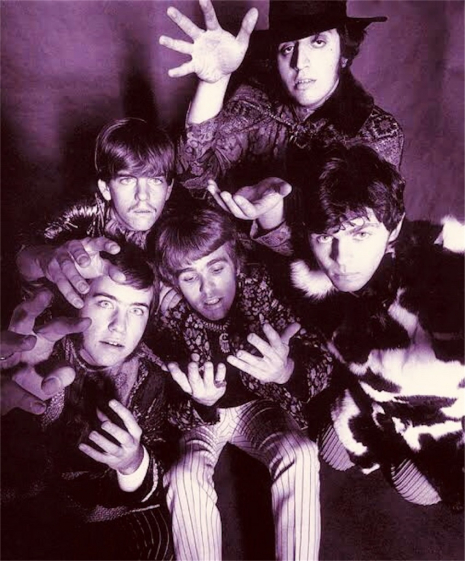
In the mid 1960s, the group Jim and the Lords inked a deal with producer Dave Hassinger’s production company. After a name change, the first Electric Prunes 45 was released. Their next two singles—1967’s “I Had Too Much to Dream (Last Night)” and “Get Me to the World on Time”—are excellent examples of American psychedelic pop/rock, and both were Top 40 hits. Those tunes were written by outside songwriters, and so was much of the Electric Prunes’ debut album, as Hassinger only permitted two group compositions on the LP. While the band successfully lobbied to have more of their own material included on album #2, Underground—and it’s a better record—there were no hit singles from it, and the LP didn’t do much in the marketplace. Things were about to change for the band in a way none of them could have foreseen.
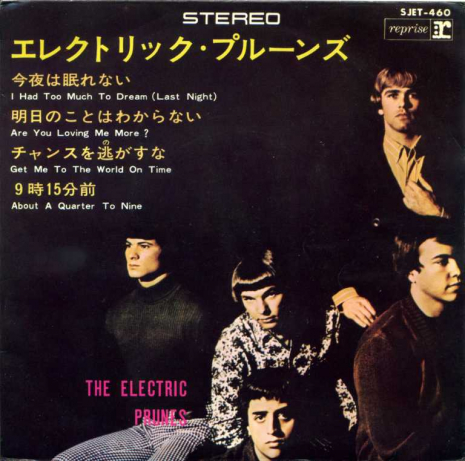
Picture sleeve for a 1967 Japanese EP.
For the third Electric Prunes record, the trio of Hassinger, Prunes manager Lenny Poncher, and noted producer, arranger, and composer David Axelrod came up with the idea for the group to record an album of Axelrod’s compositions. The LP would combine classical and religious music with psychedelic rock. Once in the studio, the band was slow to pick up the material, as most of them didn’t read music. The pace of the learning curve wasn’t to Axelrod’s liking, so another group, the Canadian outfit the Collectors, was brought in, along with session musicians. In the end, the actual Electric Prunes only play on side one of Mass in F Minor (1968), though a few members, including lead singer James Lowe, appear on all of the tracks. The album—a rock opera in which all the lyrics are sung in Latin—is a mixed affair. It’s certainly odd and obtuse. The opening number, “Kyrie Eleison,” is the highlight and also the record’s best-known song, as it later appeared in the film Easy Rider (1969) and on its soundtrack. It’s the only track on the album lacking any orchestral accompaniment.
By the end of ’68, the Electric Prunes had broken up, though their moniker lived on.
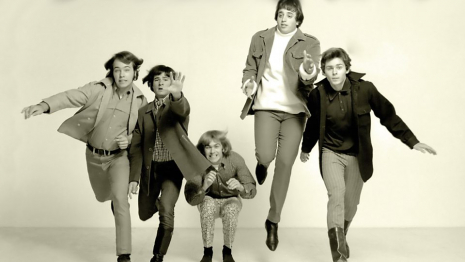
Dave Hassinger owned the Electric Prunes’ name and would continue to use it on subsequent LPs, despite the fact the no original members remained. Which brings us to album number four.
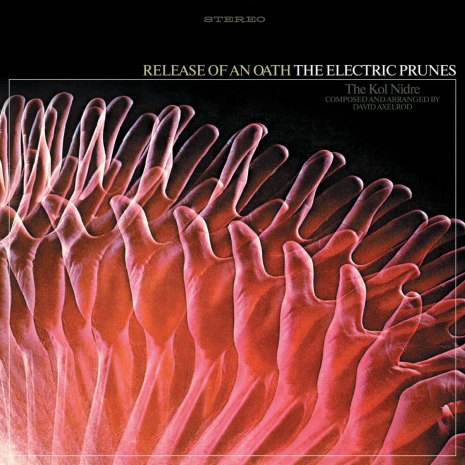
Release of an Oath is similar to Mass in F Minor in that it’s another religious rock opera composed and arranged by David Axelrod. The album was based on the Kol Nidre, the ancient Jewish prayer recited on the Day of Atonement. Considering the record is significantly better than Mass in F Minor, it’s surprising that the whole thing was written by Axelrod in just a couple of days, and recorded in not much more time than that. For this album, members of the Colorado group Climax and one of the Collectors were recruited, as were dependable session pros like bassist Carol Kaye and guitarist Howard Roberts, who laid down a blistering guitar solo for the otherwise solemn “Holy Are You.” Gorgeous and moving, “Holy Are You” is Axelrod’s finest work with the Prunes.
On the whole, Release of an Oath succeeds where Mass in F Minor failed, resulting in a record that’s enjoyable front to back. Believe or not, it’s the most consistently good Electric Prunes album. You can easily hear for yourself, as Release of an Oath is on Spotify and YouTube.
While Mass in F Minor charted and did okay sales-wise, Release of an Oath bombed. This marked the end of David Axelrod’s association with the Electric Prunes.
Arriving on June 12th is Real Gone Music’s LP reissue of Release of an Oath. This new edition, featuring the original album artwork and pressed on maroon and white splatter vinyl, is limited to just 1,000 copies. Get yours through Real Gone’s website or via Amazon.
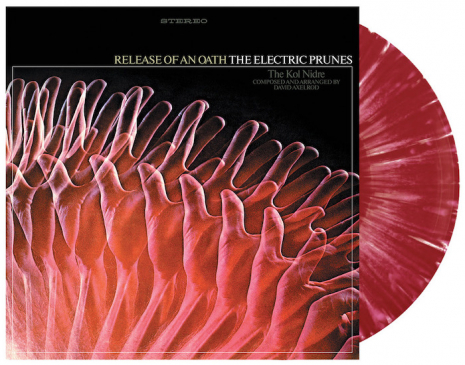
There would be one final Electric Prunes album. Released in 1969, the line-up on Just Good Old Rock and Roll was essentially the same group of guys who played the basic tracks on Release of an Oath. Credited as the “new improved (sic) Electric Prunes” on the cover, it’s an undistinguished record that’s not worth your time. Nearly all of the songs were written by the group, the sort of creative freedom Dave Hassinger never gave the original band.

The Electric Prunes, c. 1967.
We’ll leave you with the strange promo film for the first two songs from side one of Mass in F Minor.
Previously on Dangerous Minds:
The classic Big Star songs that aren’t Big Star, but a studio project dubbed the Dolby Fuckers